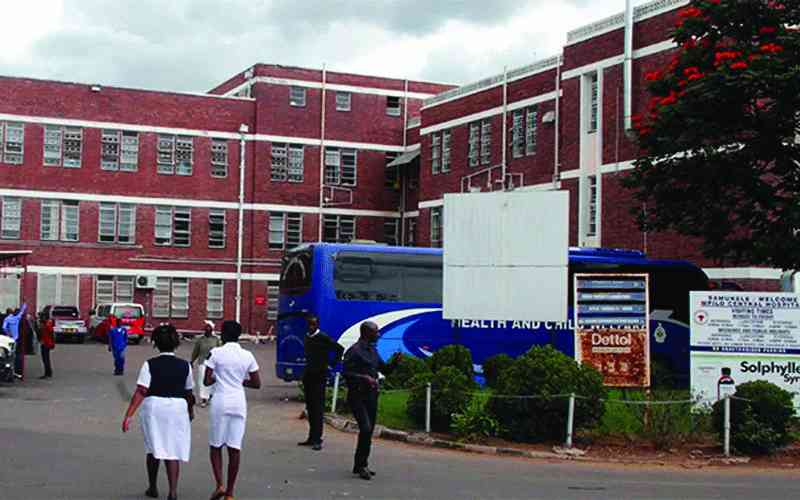
SHOCKING evidence of mismanagement at Mpilo Central Hospital surfaced this week, with a report by acting auditor-general Rheah Kujinga revealing that key staff members who had left the organisation were still listed as signatories
In a report submitted to Parliament, Kujinga highlighted that Mpilo's internal control system over cash and bank operations was weak, exposing the hospital to unauthorised transactions.
“Mpilo Central Hospital’s internal control system over cash and bank was weak in that the former employees of the hospital were still on the bank signatories panel,” Kujinga said.
“The risk includes financial loss due to irregular transactions.”
The report covering the financial year ended December 31, 2023, painted a concerning picture at several major state hospitals including Chitungwiza Central Hospital, Ingutsheni Central Hospital, Mpilo, Parirenyatwa Group of Hospitals, Sally Mugabe Central Hospital and United Bulawayo Hospitals (UBH).
“Chitungwiza Central Hospital’s accounting system malfunctioned, as a result, records were being maintained in excel, accounting records were previously maintained partially in Pastel and SAP. However these accounting systems were no longer in use,” stated the report.
“Accounting records for the year ended December 31, 2020 were prepared from a combination of information from Pastel, SAP and excel records. I could not, therefore, ascertain accuracy and completeness of information.
“There was no evidence that an independent person reviewed the bank and cash reconciliations that were being prepared manually, as a result, there was a variance of ZW$4 740 between the trial balance and the bank statement,” points out the report.
- MPs urge Chiwenga to probe corruption, abuses at hospitals
- Mpilo doctors’ quarters rehab complete
- Crocodile attack victim recounts horror encounter
- Mpilo turns away cancer patients
Keep Reading
Kujinga said the hospital's reliance on manual records and the absence of independent reviews of bank reconciliations raised concerns about the accuracy of financial reporting. Looking at Ingutsheni, it said failure to conduct physical inventory counts casts doubt on the valuation and existence of reported inventory.
“The hospital did not avail evidence that inventory counts were conducted during the year and at year's end. As a result, I could not ascertain the valuation and existence of inventory presented in the financial statements amounting to ZW$53,5 million,” Kujinga said.
“The hospital was not consistently utilising issue vouchers when dispatching goods; I was not availed with issue vouchers for inventory dispatched for sales amounting to ZW$394 615 pertaining to the period of September to December 2020.
“The hospital did not maintain a donations register to record and track all donations received during the period under review. As a result, I was unable to ascertain the completeness and valuation of the donations received amounting to ZW$88,6 million recorded in the financial statements,” read the report.
Kujinga said the absence of a donations register further hindered transparency regarding the completeness and valuation of donations received.
According to the report, the failure by Sally Mugabe hospital to conduct annual impairment assessments for its assets and review their residual value and useful life was a violation of International Accounting Standards as this omission increases the risk of misstatement in financial statements.
“I was not availed with inventory supporting documentation such as the invoices. As a result, I could not carry out alternative procedures to be satisfied that the inventory amount disclosed in the financials is not materially misstated,” Kujinga said.
Parirenyatwa was found wanting on service delivery and updating policies and practices, which may cause financial loss due to policy inconsistency.
“The hospital was taking long to update policies following changes in the operating environment,” states the report.
The hospital revised lease terms of its leasing arrangements from two years to one year and this change was not aligned to the policy on institutional accommodation.
“The hospital was allocated a capital grant of ZW$800 million for the 2022 financial year. However, no funds were received from the capital grant allocation. As a result, hospital infrastructure had gone for years without rehabilitation,” the report says.
“For instance, the kitchen ceiling had deteriorated and the old kitchen equipment such as steamers, electric stoves, freezers and ovens were not functioning and some have since been decommissioned.
“This may risk service delivery, (it) may be compromised,” it reads.
According to the audit, the dismissal and suspension of key personnel at UBH prior to the audit, without proper handover procedures hampered the audit process and potentially compromised service delivery.
The exchange rate on the last day of December 2023 was US$1;ZW$22 000, for December 2020 US$1:ZW$81,78 and December 30 2022 US$1:ZW$671,44.











